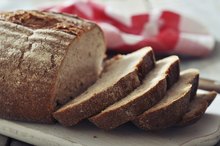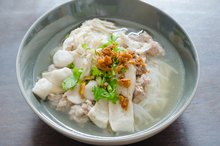What Happens to Sugar Levels in the Blood While Fasting?
Blood sugar, also known as glucose, is the body's main source of energy, according to the Mayo Clinic 1.
The body gets most of its glucose by metabolizing the carbohydrates in food. But going too long without food can cause dangerously low blood sugar in people with medical conditions such as diabetes 3.
Related Articles
References
- Mayo Clinic: "Hypoglycemia"
- Kaiser Permanente: " How the Body Controls Blood Sugar"
- Diabetes.co.uk: "Blood Sugar Level Ranges"
- American Diabetes Association: "Diagnosis"
- World Journal of Diabetes: "Mechanisms of Hypoglycemia Unawareness and Implications in Diabetic Patients"
- National Institutes of Health: "What is Diabetes?"
- Hormone.org: "Non Diabetic Hypoglycemia"
- University of California, San Francisco: "The Liver & Blood Sugar"
- American Diabetes Association. 5. Lifestyle management: Standards of medical care in diabetes-2019. Diabetes Care. 2019;42(Suppl 1):S46-60. doi:10.2337/dc19-S005
- National Institute of Diabetes and Digestive and Kidney Diseases. Diabetes diet, eating, & physical activity. Published December 2016.
- American Diabetes Association. The big picture: Checking your blood glucose.
- American Diabetes Association. 6. Glycemic Targets: Standards of Medical Care in Diabetes-2020. Diabetes Care. 2020;43(Suppl 1):S66-S76. doi:10.2337/dc20-S006
- American Diabetes Association. 14. Management of diabetes in pregnancy: Standards of medical care in diabetes-2020. Diabetes Care. 2020;43(Suppl 1):S183-S192. doi:10.2337/dc20-S014
- Porcellati F, Lucidi P, Bolli GB, Fanelli CG. Thirty years of research on the dawn phenomenon: Lessons to optimize blood glucose control in diabetes. Diabetes Care. 2013;36(12):3860-2. doi:10.2337/dc13-2088
- American Diabetes Association. 5. Lifestyle management: Standards of medical care in diabetes-2019. Diabetes Care. 2019;42(Suppl 1):S46-60. doi:10.2337/dc19-S005
- Colberg SR, Sigal RJ, Yardley JE, et al. Physical activity/exercise and diabetes: A position statement of the American diabetes association. Diabetes Care. 2016;39(11):2065-2079. doi:10.2337/dc16-1728
- American Diabetes Association (ADA). Understanding A1C.
- Garber AJ, Abrahamson MJ, Barzilay JI, et al. Consensus statement by the American association of clinical endocrinologists and American college of endocrinology on the comprehensive type 2 diabetes management algorithm - 2019 executive summary. Endocr Pract. 2019;25(1):69-100. doi:10.4158/CS-2018-0535
Writer Bio
Amber Keefer has more than 25 years of experience working in the fields of human services and health care administration. Writing professionally since 1997, she has written articles covering business and finance, health, fitness, parenting and senior living issues for both print and online publications. Keefer holds a B.A. from Bloomsburg University of Pennsylvania and an M.B.A. in health care management from Baker College.









